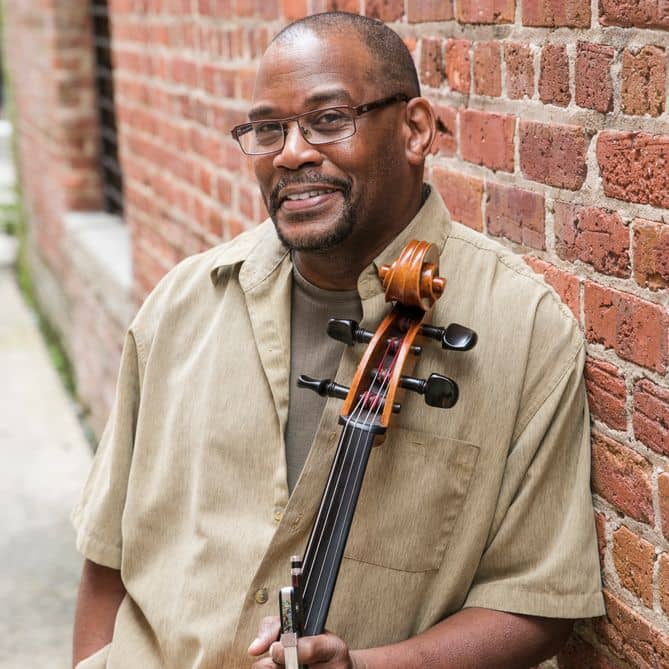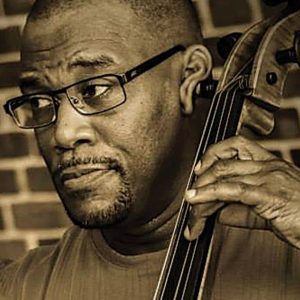
Suggested Works by Black Composers for Students
Timothy Holley
I’m pleased to introduce and provide this list of graded music for cello of African-American composers for student exposure, education and use in performance. Some of these pieces are “adopted and adapted” from the Negro spiritual tradition. Such adaptation should not pose unusual difficulties for the developing cellist; however, the larger editorial challenge lies in matters of fingering and bowing. A minimum technical level of Suzuki Book 4 proficiency should be sufficient for most players to execute the majority of these pieces.
This music stands apart from the larger European pedagogical tradition and technical orientation, but should find a place of similarity and alliance with the Suzuki-influenced folk song repertoire that so many of us have heard in our early lessons and gradual indoctrination into the European-American art-music tradition. It is my sincere hope that these pieces speak to each musician on larger cultural levels and in directly endearing musical ways. Just as a creative and performance “space” was made for the Negro spirituals through the work of Harry Thacker Burleigh, Roland Hayes, Paul Robeson and Marian Anderson, so should a parallel instrumental tradition be easily “adopted, adapted”—and inculcated into the “pedagogical cello repertoire,” which informs and buttresses the standard repertoire. This graded repertoire should also serve as technical and aesthetic “preparation” for study and performance of the more advanced “standard-level” repertoire of African American composers.
Most titles are commercially available online. Other specific titles can be acquired directly from the composers or from myself, Dr. Holley.
Music of Black Composers (MBC), Violoncello Repertoire List
(partial, graded in terms of technical difficulty/requisite musical maturity):
Technical Level “A”: Nearly all settings of Negro spirituals (unless otherwise indicated). Level “A” is largely concentrated in 1st and 2nd positions, and contains a fair degree of flexibility and contained melodic range.
Roy Belfield, Jr. (b.1968): Two Spirituals—”So Glad I’m Here”, “Guide My Feet” (2013). Find more score information here.
Margaret Bonds (1913-1972): “He’s Got The Whole World In His Hands” (1959); “Go Tell It On The Mountain” (1962); “Joshua Fit The Battle of Jericho” (1963); Publisher(s): Beekman Music/Mercury Music, Theodore Presser.
Barbara Logan Cooke (1921-2017): Two Negro Spirituals: “Jesus Walked This Lonesome Valley”; “Fix Me, Jesus” (1997); Publisher: Original manuscript.
Betty Jackson King (1928-1994): “Calvary” (1983). Publisher: Chicago, IL: Jacksonian Press, Inc. Find more score information here.
Phillip McIntyre (1951-1991): “Heav’n Bound Suite” (cello and organ/piano, 1987). Find more score information here.
Hale Smith (1925-2009): “I Want To Die Easy” (1988). Halsco Publishers.
William Grant Still (1895-1978): “Here’s One” (1941). Original version in E minor. Publisher: Bryn Mawr, PA: The John Church Company/Theodore Presser Company, Carl Fischer. Arrangement for violin and piano by Louis Kaufman. Williamgrantstillmusic.com
Dolores White ( b.1933): Two Spirituals (1987), “Little David Play On Your Harp”; “Were You There”. Cleveland, OH: Ludwig Publishing Company. Find more score information here.
John W. Work III (1901-1967): This Little Light of Mine (1945). Galaxy Music Corporation. Find more score information here.
Technical Level “B”: Progressing beyond first and second position at the cello.
Margaret Bonds (1913-1972): Troubled Water, version for cello and piano (1948)/Manuscript
Claudio Brindis de Salas (1852-1911): Consolation, Opus 5 (Chanson Sans Paroles) for piano and violin; Paris: Louis Gregh, c.1886
Charles S. Brown (b.1935): Songs Without Words (c.1977). Willis C. Patterson, Anthology of Art Songs by Black American Composers; Edward B. Marks Music Company/Hal Leonard Music.
Lawrence Brown (1893-1972): SPIRITUALS: Five Negro Folk Songs for Cello and Piano (1923), “Nobody Knows de Trouble I See; “I Know de Lord’s Laid His Hands On Me”; “Sometimes I Feel Like A Motherless Child”; “Swing Low Sweet Chariot”; “Ev’ry Time I Feel de Spirit”. Schott & Co, London, 1923
Lawrence Brown (1893-1972): Arranged for voice and piano. “Didn’t My Lord deliver Daniel?”; “Who’s Been Here?” (“Shortnin’ Bread” refrain); “Hear de Lam’s a-cryin’” (“Feed My Sheep”); “Goin’ to ride up in de Chariot”; “Dere’s a Man goin’ roun’ takin’ Names”. Schott & Co., London, 1930
Harry T. Burleigh (1866-1949): Spirituals: “Nobody Knows de Trouble I See”; “Sometimes I Feel Like A Motherless Child” (c.1916); Southland Sketches (orig. vn/pno, 1916). Find more score information here. Recommending mvts. 1 & 3 only here.
Jacqueline Hairston (b.1932): “Guide My Feet,” Classical Vocal Reprints, 1991. Find more score information here.
Moses Hogan (1957-2003): Deep River (2000). Hal Leonard Publishers.
James Lee III (b.1975): This Little Light of Mine (2001). Willis C. Patterson, Anthology of Afro-American Art Songs by Black American Composers, Volume Two.
Undine Smith Moore (1904-1989): “Ride Up In The Chariot” (1978). Willis C. Patterson, Anthology of Art Songs by Black American Composers. Edward B. Marks Music Company/Hal Leonard Music.
Coleridge-Taylor Perkinson (1932-2004): A Child’s Grace (1977). Willis C. Patterson, Anthology of Art Songs by Black American Composers; Edward B. Marks Music Company/Hal Leonard Music.
John C. Payne (1872-1952): “Crucifixion” (c.1925); New York: G. Schirmer, Inc.
Florence Price (1887-1953): Three Spirituals for Violin and Piano (1933), “O Holy Lord”; “Sometimes I Feel Like A Motherless Child”; “Lord, I Want To Be A Christian”. Fayetteville, AR: ClarNan Editions, Classical Vocal Reprints. Find more score information here.
Ignatius Sancho Africanus (1729-1780): Twelve Country Dances (flute and cello, c.1779)
Maria Thompson (b. 1966): Motherless Child (2017); Wade In The Water (2020). MTC.
Clarence Cameron White (1880-1960): Fantasy on Negro Themes, Op.63 (1948). Find more score information here.
Clarence Cameron White (1880-1960): Bandanna Sketches (orig. vn/pno, 1920). Find more score information here.
Clarence Cameron White (1880-1960): From The Cotton Fields, Op. 18 (orig. vn/pno, 1920). Find more score information here.
Clarence Cameron White (1880-1960): Plantation Song (Based on the Negro Spiritual “Swing Low, Sweet Chariot”), Op. 27, No.1; New York: Carl Fischer, Inc., 1936.
Character/Genre/Concert Pieces/Art Songs (Technical Level “B”):
Regina A. Harris Baiocchi (b.1956): “Miriam’s Muse” (mvt. 2) from Three Sketches for Piano Trio (cello and piano, 2012). Find more score information here.
Samuel Coleridge-Taylor (1875-1912): “Willow Song” (Othello); Three Dream Dances (The Forest of Wild Thyme”, c.1910).
Jeraldine Saunders Herbison (b.1941): Intermezzo for Cello and Piano, Opus 9 (1969); “Upon An Airy Upland”; Invention No.1 for Cello and Piano, Op.24 (1989). Contact the composer directly at jesauher@gmail.com.
Mark A. Lomax II (b.1979): Lining Hymn (“By Grace”, mvt 3, solo excerpt). Find more score information here.
Joseph Hansen Kwabena Nketia (1921-2018), “Antubam” (Wailing Song).
Coleridge-Taylor Perkinson (1932-2004): “Calvary Ostinato” from Lamentations (1973). Tosci Music. Lauren Keiser Music (LKM), 1980. Find more score information here.
Hale Smith (1925-2009): “March Moon” from Beyond The Rim Of Day (1970). Find more score information here.
William Grant Still (1895-1978): Summerland (1936); Mother and Child (Suite for Violin and Piano, 1943). Find more score information here.
Richard Thompson (b.1952): The Negro Speaks of Rivers (2007). Find more score information here.
Dolores White (b.1933): Prelude on Edge (1994); Tango (1997). Find more score information here.
**Arthur Benjamin (1893-1960): Five Negro Folk Songs (1923). Schott/UK
**Tom Cipullo (b.1956): “Frederick Douglass” from America 1968 (2008)
**White composers whose contributions to this repertoire SHOULD NOT be overlooked, and included in this list for good reason in light of the genre, or in the profound setting of poetry by an African American poet, in the case of Tom Cipullo—the poet Robert Hayden (1913-1980).
Subjects: Repertoire
